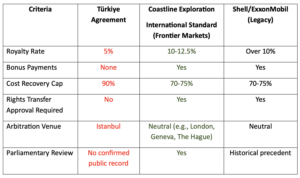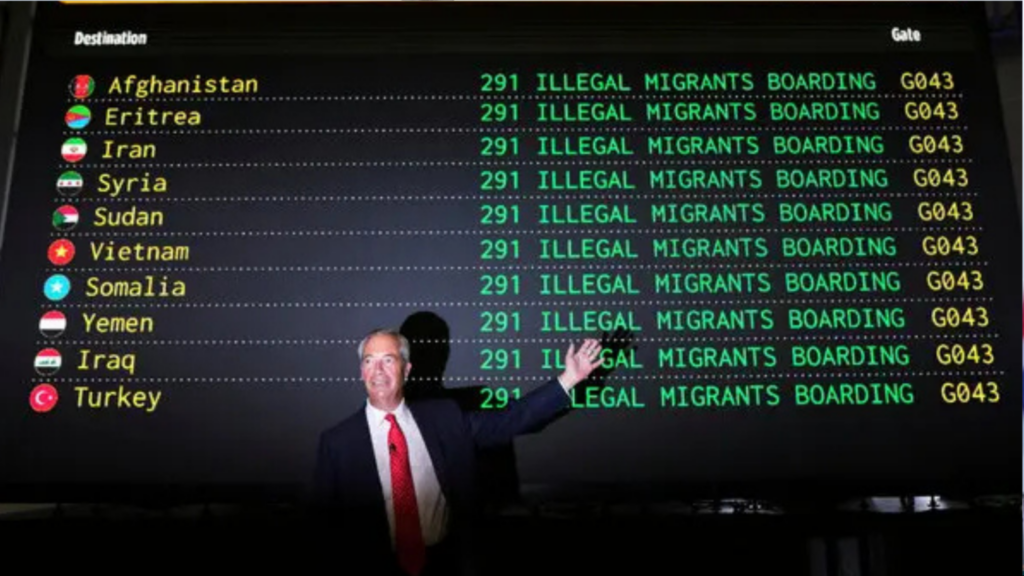Power, Profit, and Ports
A Realist Analysis of the Türkiye-Somalia Hydrocarbons Agreement
Abstract
This article analyzes the 2024 hydrocarbons agreement between Türkiye and Somalia from a realist international relations perspective. Realism views global politics as a contest of power, where national interest outweighs normative or legal considerations. The deal, which grants Türkiye expansive rights over Somali offshore energy resources, reflects a transactional relationship driven by mutual but unequal goals–strategic depth for Türkiye and short-term security and investment for Somalia. Therefore, the analysis explores how sovereignty, military projection, and energy access intersect in this asymmetric agreement.
Introduction
In March 2024, the Federal Government of Somalia signed a hydrocarbons exploration and production agreement with the Republic of Türkiye. As a result, the deal grants Türkiye access to three offshore blocks covering 5,000 square kilometers and allows broad discretion in resource extraction, cost recovery, and dispute resolution. While widely criticized for favoring Türkiye, the agreement exemplifies the realist principle that states act primarily in pursuit of national interest and survival.
Strategic Depth Over Legal Formalities
From a realist standpoint, Türkiye’s entry into Somalia’s energy sector is part of its broader ambition to gain strategic depth across Africa. Moreover, as its domestic energy consumption grows and geopolitical ambitions expand, Türkiye is aggressively pursuing access to overseas energy reserves. Thus, Somalia’s untapped offshore resources—estimated at up to 30 billion barrels—offer an opportunity not only for economic gain but also for geopolitical leverage in the Red Sea and Gulf of Aden.
Furthermore, the deployment of the Oruç Reis research vessel and supporting naval fleet in Somali waters underscores that this is not just about hydrocarbons—it is about maritime control, naval projection, and influence over global trade routes.
Somalia’s Trade-Off: Sovereignty for Survival
Meanwhile, Somalia’s position is more constrained. Facing internal insecurity, economic fragility, and reliance on foreign assistance, it turned to Türkiye for investment, security cooperation, and legitimacy. However, in doing so, it traded long-term sovereignty for short-term gains. Under the agreement:
Comparison of Petroleum Agreements

In a realist world, these terms are not irrational—they reflect Somalia’s weak bargaining position and Türkiye’s superior leverage.
Institutional Weakness and Legal Flexibility
Critics argue that the deal violates Somalia’s 2019 Petroleum Law and lacks parliamentary approval. Realism, however, dismisses such legal formalities if they do not align with power dynamics. Therefore, Somalia’s limited institutional capacity means enforcement mechanisms are weak, and elite capture is likely. This enables Türkiye to secure one of the most favorable foreign oil contracts in East Africa.
Additionally, the arbitration clause (Article 9) further ensures that Türkiye can control legal outcomes if disputes arise. Thus, by choosing Istanbul instead of a neutral venue like London or Geneva, Türkiye minimizes external legal constraints.
Naval Power and Strategic Encirclement
Türkiye’s growing military presence in Somalia—already home to its largest overseas base—complements its economic influence. The hydrocarbons agreement allows Türkiye to use naval assets to protect its exploration missions, thus reinforcing its position in the Horn of Africa. Moreover, this aligns with realist doctrines of securing sea lanes, building hard power capacity, and deterring rival actors in strategically vital zones.
Comparative Terms
Compared to Coastline Exploration and Shell/ExxonMobil deals:
- Royalty Rates: Türkiye’s deal provides only 5% royalties; Coastline offers 10-12.5%.
- Bonuses: Türkiye pays none; the others include significant bonus structures.
- Cost Recovery: Türkiye recovers up to 90%; others are capped at 70-75%.
- Arbitration: Türkiye chose a domestic venue (Istanbul); the others use neutral venues.
This disparity illustrates how Somalia’s institutional weakness and strategic vulnerability shaped the deal.
Conclusion
The Türkiye-Somalia hydrocarbons agreement reflects the core realist principle–power, not principle, determines outcomes. Therefore, Türkiye is acting rationally to secure energy and influence. Somalia, on the other hand, constrained by insecurity and institutional fragility, is making trade-offs for survival.
While legal scholars and transparency advocates critique the agreement’s imbalance, realism suggests that such asymmetries are expected in international politics. Thus, the real question is whether Somalia can convert this dependency into eventual sovereignty or remain locked in a pattern of external extraction and internal fragility.
Bibliography
Coastline Exploration Ltd., 2022. Somalia Open for Business as President Throws His Support at Major Oil Exploration Agreement. [online] Newswire.ca. Available at: https://www.newswire.ca/news-releases/somalia-open-for-business-as-president-throws-his-support-at-major-oil-exploration-agreement-816934893.html [Accessed 24 Apr. 2025].
Federal Republic of Somalia, 2019. Petroleum Law. [pdf] Available at: https://mopmr.gov.so/wp-content/uploads/2025/03/SOMALI-PETROLUEM-LAW-FEB-2020-1.pdf [Accessed 24 Apr. 2025].
Kenez, L., 2025. Turkey secures rights to 90 percent of oil and gas output in Somalia deal, document shows. [online] Nordic Monitor. Available at: https://nordicmonitor.com/2025/04/turkey-secures-exceptional-rights-in-somalia-oil-agreement-documents-show/ [Accessed 24 Apr. 2025].
Shaw, A., 2024. Turkey signs agreement for oil exploration in Somalia. [online] Offshore-technology.com. Available at: https://www.offshore-technology.com/news/turkey-to-explore-oil-fields-in-somalia/ [Accessed 24 Apr. 2025].
Transparency International, n.d. Natural Resource Governance. [online] Available at: https://knowledgehub.transparency.org/topics/natural-resource-governance [Accessed 24 Apr. 2025].
UNCITRAL, 2010. UNCITRAL Arbitration Rules (as revised in 2010). [pdf] Available at: https://docs.pca-cpa.org/2016/01/UNCITRAL-2010-English.pdf [Accessed 24 Apr. 2025].
Carnegie Europe, 2023. Turkey’s Africa Strategy: Ambition Meets Constraints. [online] Available at: https://carnegieeurope.eu/strategic-turkey-africa [Accessed 24 Apr. 2025].



